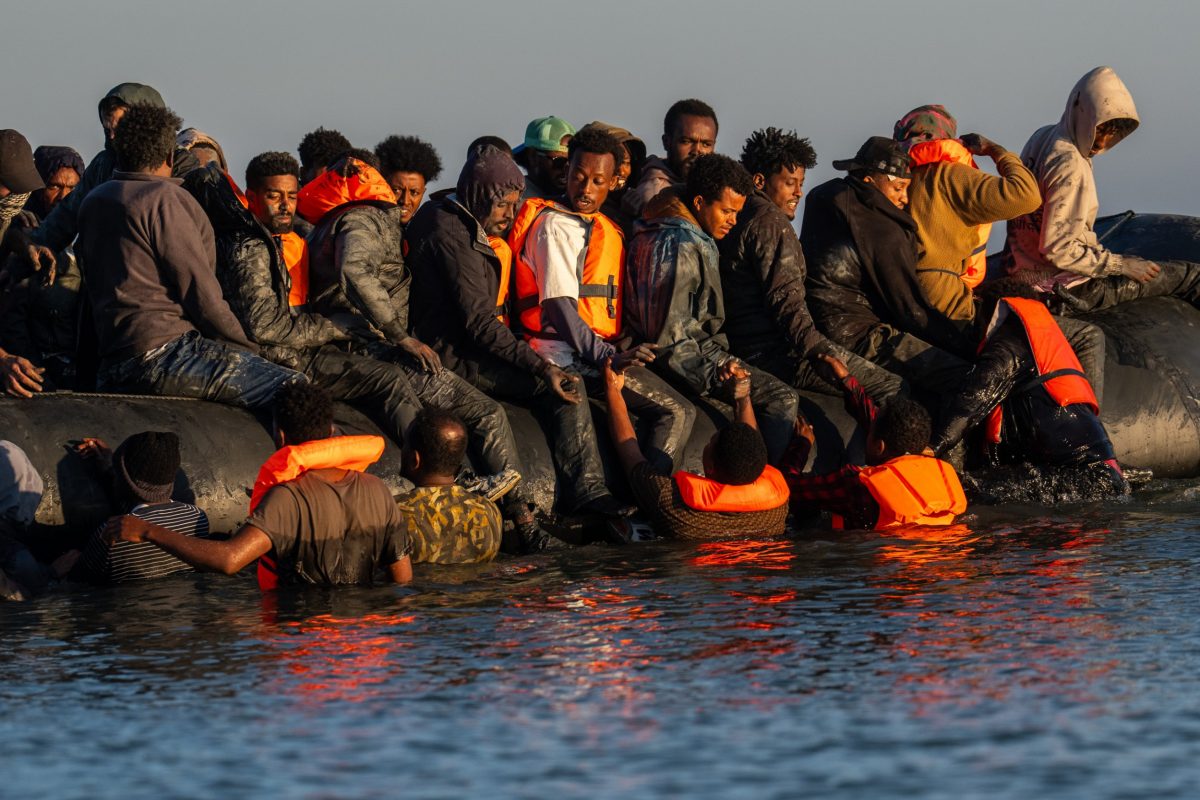Top Stories
Starmer Blames Farage for Surge in Illegal Channel Crossings

Sir Keir Starmer, leader of the Labour Party, has attributed the increase in illegal Channel crossings to the influence of Nigel Farage and the implications of Brexit. Speaking at the Labour Party conference in Liverpool, Starmer argued that the UK’s current migration challenges can be traced back to the campaign led by Farage to leave the European Union in 2016. He specifically noted that the departure from the EU resulted in the loss of migrant return agreements with 27 EU nations, which he claims has contributed to a rise in small boat crossings since the UK officially left the bloc in January 2020.
Starmer stated in an interview with GB News, “I would gently point out to Nigel Farage and others that before we left the EU, we had a returns agreement with every country in the EU. He told the country it would make no difference if we left. He was wrong about that. These are Farage boats coming across the Channel.” This assertion raises questions about the correlation between Brexit and the rising tide of irregular migration to the UK.
Examining the Numbers
Data from the Home Office reveals that, prior to Brexit, the UK received 10,608 asylum seekers via small boats from 2018 to 2020. Following the official exit from the EU, this figure skyrocketed to 28,526 in 2021, peaking at 45,755 in 2022 before decreasing to 29,437 in 2023. In total, more than 160,000 migrants have arrived in the UK by small boat since 2020, with this year alone seeing 19,982 crossings between January and June.
Dr Peter Walsh, a senior researcher at the University of Oxford’s Migration Observatory, highlighted that the absence of a returns agreement with the EU could be a significant factor in the surge. He explained that leaving the Dublin Regulation, which facilitated the transfer of asylum seekers to their first country of entry, may have incentivized migrants to make the perilous journey to the UK. The UK’s withdrawal from the European asylum fingerprint database, Eurodac, means that the Home Office cannot track whether individuals have previously claimed asylum in another EU country. Walsh noted, “In a sense, it’s another bite of the cherry if you can get to the UK.”
Earlier this year, Starmer initiated a “one in, one out” migrant returns deal with French President Emmanuel Macron. Since the agreement was implemented in September 2023, six migrants have been returned to France, although its effectiveness as a deterrent remains uncertain.
Global Conflicts and Legal Routes
The current state of global conflict is unprecedented, with the Institute for Economics and Peace recording 59 wars across more than 35 countries in 2024. The end of the war in Afghanistan in 2021 did not quell migration; instead, fears regarding the Taliban have led to further displacements. The ongoing civil war in Sudan, which began in 2023, has reportedly made Sudanese nationals the largest group of migrants in Calais.
In 2024, 99 percent of those crossing the Channel sought asylum, indicating they were fleeing persecution or threats in their home countries. To claim asylum in the UK, individuals must be physically present in the country, as there are no visa options available for asylum seekers. The existing pathways for refugee resettlement are limited and primarily nationality-specific, which leaves those from many countries without a legal route to seek asylum.
According to the Migration Observatory, individuals lacking a passport or those from the 67 countries that require visas to enter the UK face significant barriers. These constraints often push desperate migrants towards dangerous and unofficial routes, such as small boats, as their only option for safety.
In response to the ongoing migration crisis, Home Secretary Shabana Mahmood recently announced a series of stringent new conditions for migrants wishing to settle in the UK. These measures include requirements for migrants to achieve a high standard of English proficiency, maintain employment, hold a clean criminal record, and engage in community volunteering. The proposal also aims to double the time required to qualify for indefinite leave to remain from five to ten years.
Mahmood’s approach appears to be retrospective, targeting the recent surge in migration following Brexit. This stance contrasts with Starmer’s previous characterization of Farage’s proposal to end the right to settle in the UK as “racist,” suggesting a potential conflict within the Labour Party’s stance on immigration policy.
The ongoing debate surrounding the UK’s migration crisis continues to evolve, with various factors influencing the current landscape. As discussions unfold, the implications of political choices made in the past are becoming increasingly apparent in the present circumstances surrounding migration to the UK.
-

 Health3 months ago
Health3 months agoNeurologist Warns Excessive Use of Supplements Can Harm Brain
-

 Health3 months ago
Health3 months agoFiona Phillips’ Husband Shares Heartfelt Update on Her Alzheimer’s Journey
-

 Science1 month ago
Science1 month agoBrian Cox Addresses Claims of Alien Probe in 3I/ATLAS Discovery
-

 Science1 month ago
Science1 month agoNASA Investigates Unusual Comet 3I/ATLAS; New Findings Emerge
-

 Science4 weeks ago
Science4 weeks agoScientists Examine 3I/ATLAS: Alien Artifact or Cosmic Oddity?
-

 Entertainment4 months ago
Entertainment4 months agoKerry Katona Discusses Future Baby Plans and Brian McFadden’s Wedding
-

 Science4 weeks ago
Science4 weeks agoNASA Investigates Speedy Object 3I/ATLAS, Sparking Speculation
-

 Entertainment4 months ago
Entertainment4 months agoEmmerdale Faces Tension as Dylan and April’s Lives Hang in the Balance
-

 World3 months ago
World3 months agoCole Palmer’s Cryptic Message to Kobbie Mainoo Following Loan Talks
-

 Science4 weeks ago
Science4 weeks agoNASA Scientists Explore Origins of 3I/ATLAS, a Fast-Moving Visitor
-

 Entertainment4 months ago
Entertainment4 months agoLove Island Star Toni Laite’s Mother Expresses Disappointment Over Coupling Decision
-

 Entertainment3 months ago
Entertainment3 months agoMajor Cast Changes at Coronation Street: Exits and Returns in 2025









